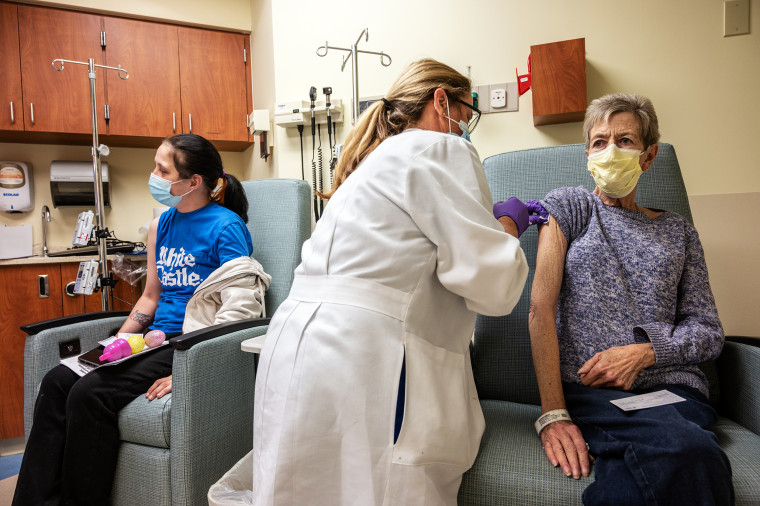A group of independent advisers to the Centers for Disease Control and Prevention urged federal regulators Thursday to move quickly in determining whether people with weakened immune systems should receive an additional dose of Covid-19 vaccine to boost their response to the shots.
The exhortations came after a presentation by the CDC to the outside group, called the Advisory Committee on Immunization Practices, on the latest research on how immunocompromised patients may — or may not — respond to Covid-19 vaccines.
Full coverage of the Covid-19 pandemic
Doctors say it is increasingly clear that many such patients are left largely vulnerable to Covid-19 following vaccination. That's because people with compromised immune systems may not mount an effective immune response against the coronavirus following vaccination.
An estimated 2.7 percent of adults in the United States are immune-compromised, the CDC said.
Such patients "are doing all they can do, by getting vaccinated, by having their close contacts vaccinated. And it's not enough. They're still not protected," said Dr. Sandra Fryhofer, an internal medicine physician and member of the American Medical Association's board of trustees, during Thursday's meeting.
Indeed, those on the front lines of treating the sickest Covid-19 patients say those with compromised immune systems remain at risk.
"All of the patients that have been fully vaccinated that I've admitted to the ICU have been immunocompromised. Every single one of them," said Dr. Todd Rice, director of the medical intensive care unit at Vanderbilt University Medical Center in Nashville, Tennessee. Rice, who was not a part of the meeting, said that otherwise, his patients hospitalized with Covid-19 have been unvaccinated.
Rice co-authored a study that found 44 percent of hospitalized breakthrough Covid-19 cases in the U.S. — that is, those who are fully vaccinated but still become infected and sick enough to go to the hospital — are in people with compromised immune systems.
The study was posted on a preprint server and has not yet been peer-reviewed, but the CDC highlighted it during Thursday's meeting.
Studies examining safety and effectiveness of an extra Covid-19 shot in vulnerable populations are ongoing, and it remains unclear whether the low levels of immunity to the coronavirus in immune-compromised people can be fixed with an additional dose.
Dr. Sara Oliver, a medical epidemiologist at the CDC, pointed to research that found among immunocompromised patients who had no detectable antibody response after full vaccination, just 33 to 50 percent responded to a third dose, developing antibodies.
"The immunocompromised community is certainly aware of their risk," said Dr. Camille Kotton, an ACIP member and an infectious disease clinician specializing in solid organ transplantation at Massachusetts General Hospital in Boston. But that awareness, she said, has translated into patients deciding for themselves whether they should have booster shots.
"Many have taken matters into their own hands, and many are proceeding with additional doses of vaccine as they see fit," Kotton said. "I am concerned about them doing this in an unsupervised fashion, but as it is right now due to regulatory issues, we are not able to recommend additional doses."
Download the NBC News app for full coverage of the Covid-19 pandemic
All of the Covid-19 vaccines in use in the United States are given under emergency use authorizations by the Food and Drug Administration. The guidelines state such medicines or treatments can only be used as indicated, meaning doctors are unable to decide for themselves which of their patients might need extra protection.
Physicians can only recommend drugs — or, in this case, a vaccine — off label if the treatment has full approval from the FDA. Moderna and Pfizer-BioNTech have applied for full approval, but it's not yet been granted to either drugmaker.
But the CDC appears to be looking into ways to work around the emergency use authorizations, providing additional vaccines for immunocompromised patients.
"We are actively looking into ways that that could be done to potentially provide access earlier than any potential change in regulatory decisions," said Dr. Amanda Cohn, chief medical officer on the CDC's Covid-19 Vaccine Task Force. That could include, for example, enrolling patients in studies.
Dr. Doran Fink, deputy director-clinical of the division of vaccines and related products applications at the FDA, said the agency "is actively exploring all regulatory options for providing access to additional doses of authorized vaccines in situations where the data suggests that the benefits outweigh the risks."
"This is running away from us. Time is of the essence," Fryhofer said. "I appreciate how closely FDA is looking at the safety and how much research is being put into this decision. But I wish it would all happen faster."
Follow NBC HEALTH on Twitter & Facebook.


